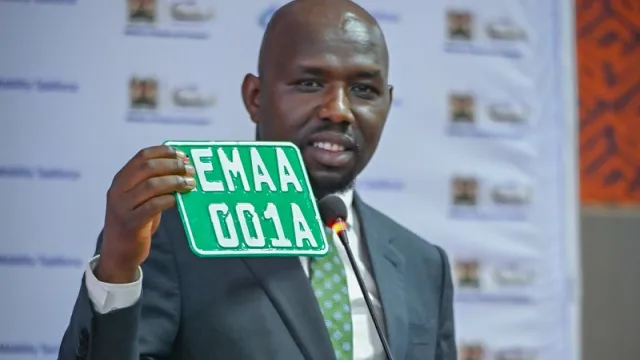Kenya introduces green plates for electric cars

Kenya introduces green plates for electric cars
The government plans to introduce green-colored number plates for electric vehicles (EVs) cars. Transport Cabinet Secretary Kipchumba Murkomen has unveiled the plan during the launch of the e-mobility policy in Nairobi.
Under the new policy, motorists who own electric vehicles, including electric motorcycles, will be issued with these distinctive green number plates.
At the same time, Mr Murkomen directed that individuals currently using number plates colored in various shades of green, particularly county enforcement officers known as "kanjos," will need to apply for new number plates.
The introduction of these green number plates aims to facilitate easier identification of electric vehicles and motorcycles on the road.
Murkomen explied that the initiative is part of efforts to promote the adoption of electric vehicles in Kenya, aligning with the government's plans to introduce more incentives for environmentally friendly technologies.
Green number plates
"We are doing this to encourage them (owners of EVs). We will also have incentives. We will talk to governors to give priority to parking spaces for electric vehicles which will be cheaper," Murkomen stated.
The rollout of the green number plates will commence after the necessary documents are officially signed by the Transport Ministry. Additionally, he announced plans for his ministry to install charging systems at its headquarters to lead by example in the adoption of electric vehicles.
Kenya’s Draft National e-Mobility Policy proposes waiving vehicle registration fees for newly registered EV drivers. It also outlines a framework to provide subsidies to public service transport operators seeking high-capacity EVs for passenger transportation.
These measures are aimed at addressing the lack of incentives for manufacturers, infrastructure developers, and consumers in the e-mobility sector.
In addressing funding challenges for road maintenance and rehabilitation, the policy proposes alternative financing structures to reduce reliance on the Road Maintenance Levy (RML) collected on petrol and diesel.
A committee will be formed to evaluate the impact of adopting e-mobility funded by RML and oversee electric mobility initiatives at the county level.
Corporate law expert Daniel Ngumy and activist Jerotich Seii have been appointed as Chairperson and Vice-Chairperson of the committee, respectively. The committee, comprising 15 members, will also establish timelines for the mandatory registration of zero-emission vehicles as part of the government's strategy to reduce emissions by 32 percent by 2030.



